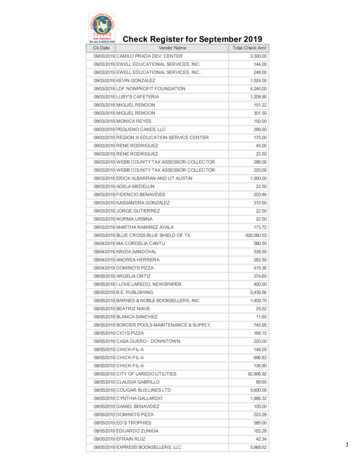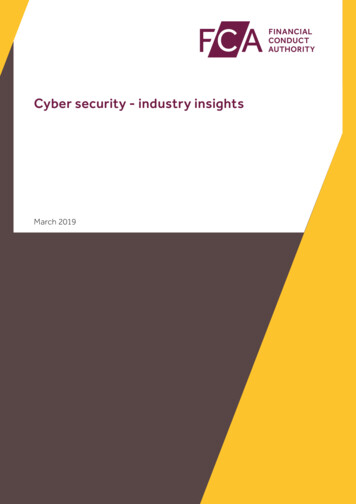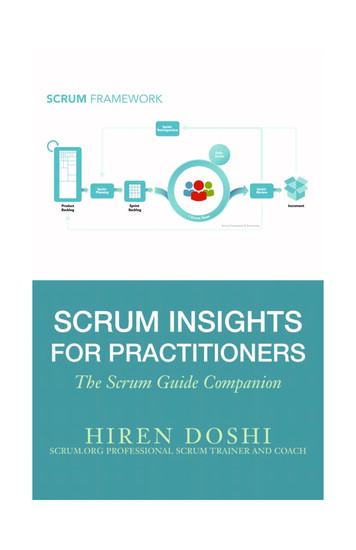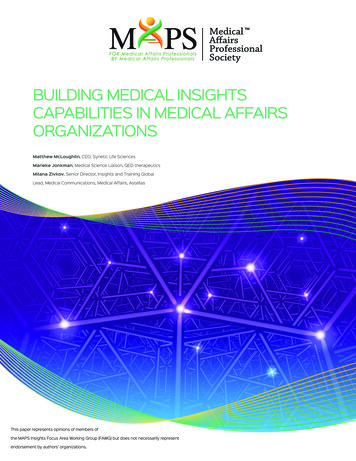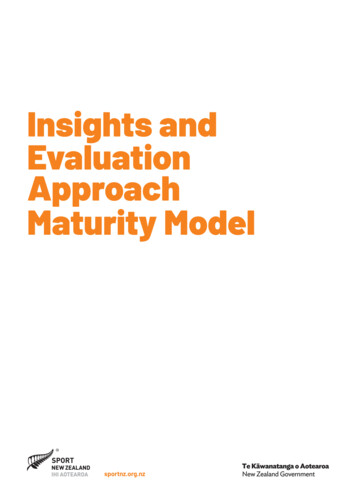
Transcription
Brexit Industry InsightsLogisticsWith the UK’s default to leave the EU without adeal, there are a number of steps businessesin the logistics sector can take to prepare. Thesector is likely to see a significant Brexit impactgiven its role in moving goods cross-border,and over the past few months businesseshave experienced increased demand fortheir services.September 2019Some of the Brexit impacts particularly relevant tothe sector, and which it is supporting its customers tomanage, include delays at ports, mandatory borderchecks, availability of drivers and their ability to operate,and ability to process the required paperwork. Theimmediate Brexit impacts are being managed against abackdrop of increased costs from technological innovationand increased demands from customers, e.g. requiringcomplete transparency over their parcels. The winners willbe those in the sector prepared for change and aliveto the opportunities.Brexit and the Logistics sectorThe purpose of the logistics sector is to move products fromA to B as quickly and as efficiently as possible. Dependingon the supply chain of a particular product, this can includemultiple iterations at different stages of the production anddistribution process. Brexit has the potential to severelyimpact on the haulage of freight into and out of the UKacross all modes of transportation: road, rail, airand maritime.What does this mean for business?Some of the key implications for businesses operating inthe sector:Road haulageRoad haulage is the dominant mode of freight transportwithin the UK1. The majority of goods imported to andexported from the UK by road are handled by overseashauliers (with vehicles mostly registered in Poland, Irelandand Romania). Conversely, UK hauliers account for 8% oftotal haulage activity in the EU. Those UK hauliers couldface several hurdles post-Brexit, particularly ina no-deal scenario:1. elect/ldeucom/355/355.pdf
Brexit Industry Insights In focus: AEO StatusDriving licences: EU licences will be recognised in the UK for temporary period,but UK drivers in the EU will need to get international driving permits.ECMT International Road Haulage Permits: European Conference ofMinisters of Transport (ECMT) permits are needed for driving through the EUand EEA countries. This applies to both laden and unladen journeys. If the UKleaves the EU without a deal, then many journeys will require an ECMT from1 January 2020 (once short-term contingency measures end). The number ofavailable permits, however, is limited.Working Time Directive: drivers are subject to the provisions of the WorkingTime Directive. Being caught up in queues at the border would add to workingtime, and drivers may find that even when permitted to proceed at the border,they will not be able to do so before a mandatory break.Unaccompanied freight can reduce the risk of delay as a result of restrictions relevantto drivers described above, but often it entails a longer journey time – and making therelevant network changes would take time to implement.Air FreightCargo services by UK carriers between EU member states and third countries will becapped at 2018 flight frequency levels2, which limits the extent to which businesses canswap to air freight to avoid delays at sea ports and the Channel Tunnel. In addition, UKcarriers will not be able to fly between two third countries and stop in the EU, nor willthey be able to fly between two member states or within one member state which couldimpact certain freight routes.Maritime TransportShipping can be broadly thought of in terms of short-sea routes, such as those connectingEU ports, and the deep-sea routes that cross oceans. UK operators, or those dependenton UK-EU shipping routes, could face several hurdles post-Brexit, particularly ina no-deal scenario:Cabotage: transport between ports within one EU member state by a transportoperator from another country is currently liberalised for EU members but notnecessarily operators from third countries. Currently, third country operatorscan only perform cabotage where the national legislation of EU member statesextends that right to third country interests. At present, this is possible inDenmark, Ireland, Belgium and The Netherlands.2. elect/cmeuleg/301-lxxiv/30105.htm#footnote-0223. Recognition of seafarer certificates of competency if there’s no Brexit deal02An Authorised Economic Operator (AEO)is an accreditation which demonstratesthat a business operates securely withinthe supply chain (AEO-S) or operatesat a high level of compliant CustomsProcesses (AEO-C).AEO traders are subject to fewerphysical checks on imports and exports,fewer post import clearance audits bythe Customs Authorities, easier accessto the use of customs procedures andbenefit from reductions to the level ofsecurity required as part of CustomsComprehensiveGuarantee requirements.AEO is applied across the EU, andthe EU has mutual recognitionarrangements with similar initiativesglobally, although as yet no suchagreement has been made between theUK and the EU post-Brexit.In order to fully benefit from theseprovisions, businesses need to beAEO certified themselves (they willnot be able to rely on a third party’sauthorisation e.g. the logistics provider).The AEO accreditation process is notstraightforward and obtaining approvalcan take up to six months once anapplication has been submitted.Whilst those in the logistics sector wereearly adopters of AEO, there continuesto be the need to consider AEO to meetcontractual demands for accreditation.
Brexit Industry Insights Seafarer certificates: the UK government has announced in a no-dealtechnical notice3 that it will seek third country recognition of UK certificates ofcompetency (CoC) as mandated by the International Convention on Standardof Training, Certification and Watchkeeping for Seafaraers (STCW). EU and EEAissued CoCs will continue to be recognised in the UK.Maritime security notifications: shipping companies, including ferriescarrying passengers and lorries are required to submit security informationprior to entering an EU port. This requirement can be waived by EU countries forintra-EU operations but not between EU and non-EU services. The submissionof this pre-arrival information could mean additional information will be neededto be submitted by those using the services in order to allow the shippingcompanies to undertake these procedures.Border DelaysThe UK government is estimating there will be a six month period of disruption at the UKborder, being at its worst for first three months4. Delays could arise due to a numberof factors: Additional safety and security checks required at the border and limited spaceto undertake these Drivers not having the necessary licences and permits Inexperienced traders not having the necessary paperwork when arriving atthe border.The UK government has announced certain mitigation measures which will be taken atthe border in the event of a no-deal scenario, e.g. Transitional Simplified Procedures (TSP),although logistics providers do not themselves need to register for TSP. However, it isimportant to note whilst TSP will relieve some of the pressure for freight entering the UK,at the time of writing there are no equivalent mitigating measures in place for UK freightseeking to enter the EU.ContractsSome logistics providers have written clauses into their contracts that ensure deliverywithin a certain timeframe, with penalty clauses being activated for delays to delivery.Managing these obligations in a no-deal scenario will be important to the ongoingoperations of those logistics providers. Contracts may need updating to manage some ofthe potential risks arising from Brexit or in response to Brexit-related restructuring.What can businesses todo prepare? Ensure systems and procedures are inplace to manage the increased volumeof customs declarations for importsand exports. Logistics providers and their customersshould work together on their Brexitpreparation plans to understand what, ifany, impact this will have on operations. Apply for the necessary licences andpermits; conduct a trade continuity andmarket access review to understand yourexposure to third country trade deals. Ramp up your operational responsecapability to manage disruption as andwhen it occurs, and review contractualcommitments and penalty clausesrelating to delivery times. Regularly communicate with EUworkforce to encourage statuscertification as early as possible. Establisha process that monitors member statechanges to immigration and socialsecurity that could impact UK workersin the EU. Keep up to date on UK and EUgovernment, European Commission andregulator announcements in the run upto 31 October and beyond to stay up todate on policy changes. Develop a strategy for governmentengagement on the issues that mattermost to the business in order to influencefuture policy. Manage all key stakeholders to identifycommitments and expectations.Engage with audit committees andliaise with trade bodies and regulatorson preparations.4. Letter to suppliers of medicines and medical products: 03
Brexit Industry Insights Areas of focus include: reviewing risk allocation between parties such as whichcounterparty bears the risk of border delays and tariff costs; definitions of key terms;changes to pricing structure or frequency of pricing reviews and changes to paymentterms and contract enforcementCustoms & ComplianceWhilst many logistics providers in the EU and EEA have experience of borderlesstrading in the EU, some do not have exposure to international trade and theassociated compliance requirements. Ensuring compliance with the requisitecustoms procedures and having the right documentation for consignments will be crucialto minimising delays at the border; possession of the wrong documentation could riskconsignments being turned away. Being able to identify shipments where certain productsmust be checked at the border (e.g. products of animal origin) will also be important in thisrespect.This also extends to the wood packaging material (WPM) the freight is transported onand in, including pallets, crates, boxes, cable drums, spools and dunnage. Currently,WPM moving between the UK and the rest of the EU does not need to meet InternationalStandard for Phytosanitary Measure No. 15 (ISPM15). However, in a no-deal scenario, allWPM moving between the UK and the EU will need to be ISPM15 compliant (treated andmarked) and may be subject to checks.Customs RepresentationRecipients of goods shipped across a customs border may need to make payment of duty.In a no-deal scenario, the value and volume of such payments will increase significantly.This could present challenges for logistics providers – such as communicating to parcelrecipients why/what duty is payable, ensuring robust systems and processes are in placeto handle increased payments, and the joint and several liability risk when representingcustomers in the customs declaration process.Case studyOur client, a UK port operator, wished to pursue AEO authorisation to maintain itcompetitiveness against its AEO-accredited competitors and to allow for ‘business asusual’ in the operation of its port storage areas. Additionally, our client would also havethe opportunity to reduce its exposure to financial guarantees required by HMRC in orderto operate Customs Special Procedures, should AEO status be obtained. However, it wasacknowledged there would be some difficulties in obtaining AEO status, due to a lack ofdocumented process and, in some cases, insight as to the true extent of theoperations undertaken.We visited several of our client’s locations, working with our client to enhance existingprocesses and introduce new procedures, closing the identified gaps and bringing ourclient’s processes and procedures in line with the AEO standards. Our client has nowachieved its AEO status, allowing it to better pursue its commercial strategy.04
Brexit Industry Insights How can Deloitte help?Further readingDeloitte has been supporting multiple businesses across a range of industries tounderstand the implications of, and prepare for, the UK’s withdrawal from the EU. We havesupported many clients with their Brexit planning. Our teams combine Brexit insights,industry knowledge and technical expertise to support our clients with their Brexitreadiness planning – from risk assessment to applying the lessons learned to optimise forthe future trading environment.For further information please contact brexitsupport@deloitte.co.ukIndustry contactsAmanda TickelPartner, Global Brexit LeadTel: 44 (0)20 7303 3812Email: ajtickel@deloitte.co.ukSally JonesDirector, Global Brexit InsightsTel: 44 (0)20 7007 9761Email: saljones@deloitte.co.ukJeffrie MannAssociate Director, Global TradeAdvisoryTel: 44 (0)20 7007 6975Email: jefmann@deloitte.co.ukHugh NicolsonSenior Manager, Supply ChainTel: 44 (0)121 695 5028Email: hughnicholson@deloitte.co.ukOfficial no-deal guidance forlogisticUK No-deal Technical Note:Driving in the EU if there’s noBrexit dealVehicle insurance if there’s noBrexit dealCommercial road haulage in the EU ifthere’s no Brexit dealReporting CO2 emissions for new carsand vans if there’s no Brexit dealAviation security if there’s noBrexit dealAviation safety if there’s noBrexit dealFlights to and from the UK if there’s noBrexit dealGetting an exemption from maritimesecurity notifications if there’s noBrexit dealRecognition of seafarer certificates ofcompetency if there’s no Brexit dealOperating bus or coach servicesabroad if there’s no Brexit dealRail transport if there’s noBrexit dealMeeting rail safety and standards ifthere’s no Brexit dealUK Business Preparation Tool:Prepare your business or organisationfor BrexitEuropean Commission BrexitPreparedness:Mobility and TransportThis no-deal guidance is notexhaustive. Companies shouldroutinely review the latest officialupdates and technical guidance as andwhen they are published by the UK, EU,and individual EU member states.This publication has been written in general terms and we recommend that you obtain professional advice before acting or refraining from action on any of thecontents of this publication. Deloitte LLP accepts no liability for any loss occasioned to any person acting or refraining from action as a result of any material inthis publication.Deloitte LLP is a limited liability partnership registered in England and Wales with registered number OC303675 and its registered office at 1 New Street Square,London EC4A 3HQ, United Kingdom.Deloitte LLP is the United Kingdom affiliate of Deloitte NSE LLP, a member firm of Deloitte Touche Tohmatsu Limited, a UK private company limited by guarantee(“DTTL”). DTTL and each of its member firms are legally separate and independent entities. DTTL and Deloitte NSE LLP do not provide services to clients. Please seewww.deloitte.com/about to learn more about our global network of member firms. 2019 Deloitte LLP. All rights reserved.Designed by CoRe Creative Services. RITM029207105
changes to pricing structure or frequency of pricing reviews and changes to payment terms and contract enforcement Customs & Compliance Whilst many logistics providers in the EU and EEA have experience of borderless trading in the EU, some do not have exposure to international trade and the associated compliance requirements.





